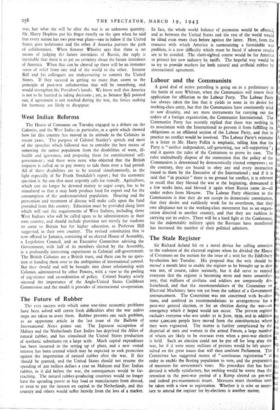West Indian Reforms
The House of Commons on Tuesday engaged in a debate on the Colonies, and the West Indies in particular, in a spirit which showed how far this country has moved in its attitude to the Colonies in recent years. The purpose of Colonel Stanley's speech and most of the speeches which followed was to consider the best means of removing the native population from the disabilities of want, ill- health and ignorance, and preparing them for constitutional self- government ; and there were none who objected that the British taxpayer is called on to pay money to tide them over a bad period. All of these disabilities are to be treated simultaneously, in the light especially of Sir Frank Stockdale's report ; but the economic question is the one that most urgently calls for remedy. Agriculture, which can no longer be devoted mainly to sugar crops, has to be stimulated so that it may both produce food for export and for the consumption of the undernourished population. Housing and the prevention and treatment of disease will make calls upon the fund provided from this country. Education must be provided along lines which will suit the requirements of West Indians, including those West Indians who will be called upon to be administrators in their own country, and should include provision not merely for students to come to Britain but for higher education, as Professor Hill suggested, in their own country. The revised constitution that is now offered to Jamaica, consisting of an elected House of Assembly, a Legislative Council, and an Executive Committee advising the Government, with half of its members elected by the Assembly, is a profoundly interesting experiment in Colonial self-government. The British Colonies are a British trust, and there can be no ques- tion of handing them over to the ambiguities of international control. But they should and will be brought into closer relationship with Colonies administered by other Powers, with a view to the pooling of experience and co-ordination of policy. Colonel Stanley wisely stressed the importance of the Anglo-United States Caribbean Commission and the model it provides of international co-operation.


























 Previous page
Previous page